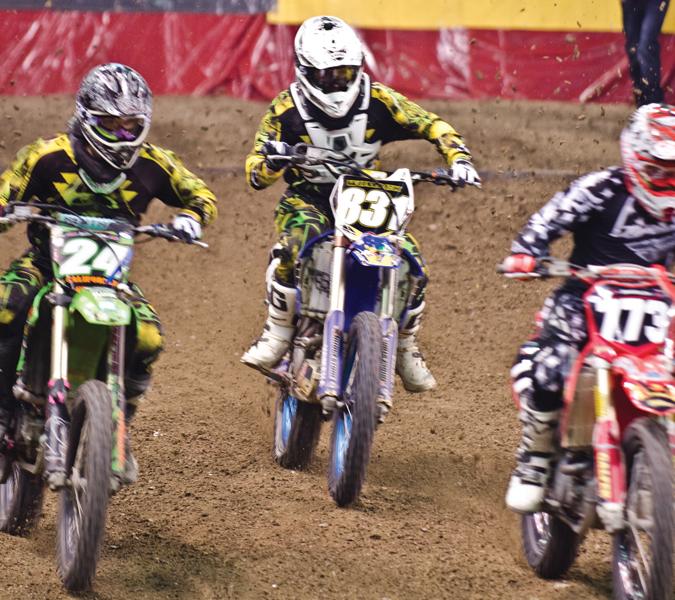Moto Club hits Arenacross
moto1:oto Club president Stenson Womack (No. 831), takes off during a preliminary heat at Feb. 27 Arenacross. :Steven Turner – State Hornet
March 8, 2011
The Sacramento State Hornet Moto Club is still in the early stages of its establishment, but its goal is to change the culture of the motocross community.
The Moto Club began last semester with a few guys that were enthusiastic about riding dirt bikes. In August of 2010 the group was officially deemed a club by the sports club program on campus.
The members meet twice a month at different locations on Sac State’s campus. The club’s president Stenson Womack, along with a few other guys, created it because they use riding dirt bikes as a break from the rigors of college.
“During the week it’s study, study, study,” Womack said. “When you’re riding you don’t think of anything else. It’s a stress reliever.”
One major agenda of the club is to get young kids who are serious riders to consider college as a place to advance their careers in the sport and earn a degree at the same time.
Young riders who are trying to make it as professionals in motocross are often home schooled because of the constant traveling throughout the country, Womack said, and creating this club is laying the foundation for future riders to compete at the college level.
“Most of the guys who take it really serious are home schooled in junior high and don’t even dream of going to college,” Womack said. “Many kids miss out on their childhood because they are gone so much.”
Womack said college basketball is a “breeding ground” for NBA recruitment and he hopes that one day motocross can be just as recognized in college. He hopes to establish a community of riders in college that could help etch a route to the professional level.
Matthew Brunstein, a sophomore mechanical engineering major and a member of the club, feels this is a great opportunity for young riders and has plans to take the sport’s popularity to new heights &- along with a message to get an education.
“I really want to get it nationally recognized, so kids understand you can still ride and race in college, and have that community still while you’re in school,” Brunstein said. “I want people to know about Sac State’s club.”
The club is trying to set up a race against Chico State’s moto club, which has been established since 2008. Brunstein said there is definitely a rivalry between the two clubs.
“We’ve already been talking loads of crap to each other,” he said.
The club’s leader, Womack, a junior biology major, grew up in Jackson Calif. and went to Argonaut High School. He said his grandpa bought him a dirt bike for his fifth birthday and he has not stopped riding since. He built his own track at his parent’s house in Jackson where the club practices. Even after all the crashes and injures he has endured in the sport he said the passion to ride outweighs any fear he has.
“When you start racing it’s addictive. You just want to keep going,” Womack said. “I’ve got a list of injuries. It’s part of the sport.”
Brunstein said he’s suffered a broken collarbone, broken fingers and has been knocked out as a result of crashing on his bike.
Womack raced in the Arenacross Series at Arco Arena, or recently named Power Balance Pavilion, on Feb 27.
Mounds of dirt were hauled into the stadium to build a small track that had several sharp turns and a large jump at the finish. Professionals raced on Saturday and amateurs, such as Womack, on Sunday.
At one turn Womack flew headfirst over his handlebars and into the dirt incline. He got up as if nothing happened and finished the race. He then went on to win the next race.
“I went from crashing in last (place), to smooth riding and winning,” Womack said.
Womack’s father, Roland Womack, was there to watch his son. He said he gets nervous sometimes when he watches him.
“It’s more of an adrenaline rush watching him race,” Roland Womack said. “But it’s a great family sport and it’s kept (Stenson) out of trouble.”
At one point during the races, a young rider crashed into the scaffolding underneath the temporary seats. Twisted against the dirt and metal bars, the boy was stretchered off the track. With bated breath in the stands, the rider gave a “thumbs up” as the medical team carried him away.
“You can’t go out there thinking, “Oh my god I’m going to crash,’ (because) you’ll never win and most likely you will crash,”
Womack said. “You’ve got to have that mentality that you think you can win and ride with as few mistakes as possible.”
Despite the dangerous nature of the sport, the club is trying to bring in new members that have a passion for racing and riding as they have, but said even if you do not have any experience they will teach any newcomer how to ride.
There are 60 to 70 people on the club’s emailing list, but only 15 to 20 members actually ride on a consistent basis and are committed to the group.
One of the benefits membership will be getting is a place to lock and store a dirt bike. Brustein, who is an officer and co-founder, said there are students from out-of-town, or who live in the dorms and do not ride because they have nowhere to store their bikes. He wants the club to provide a safe place where guys can lock it up. The money to pay for storage will come out the club dues that cost $20 per semester, which is down from $35 the previous year. They are looking for a good storage facility large enough to store the club’s bikes.
Another major benefit the club is trying to give to members is receiving a discount at local tracks, such as Hangtown in Rancho Cordova – because dirtbiking can be an expensive sport.
“Our goal is to eventually have sponsors that will give you discounts any way they can,” Brunstein said.
You can reach Joe Fleming at [email protected]










































































































































